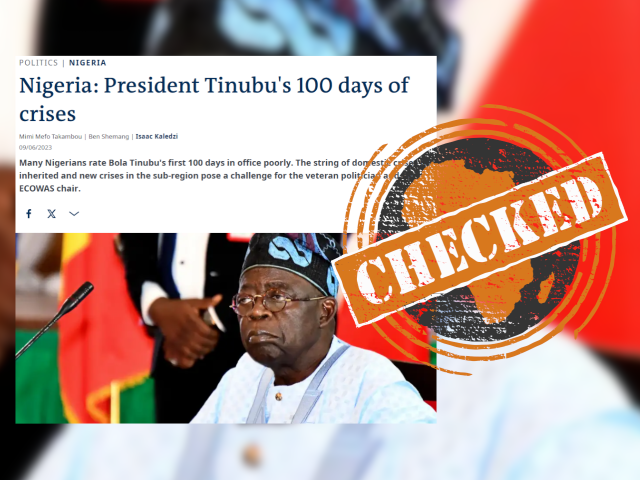This article is more than 5 years old
- Aden Duale said about KSh600 billion in taxes was being collected when the National Rainbow Coalition took power in 2002.
- He said that today, tax revenues are over KSh1.3 trillion and Kenya spends 43% of its national budget on development.
- The claim about current tax income is correct. The claims about earlier taxes and development spend are incorrect.
Aden Duale called his house colleagues “hypocrites” for their handling of the imposition of a 16% value added tax on petroleum products. He then went on to make a number of claims about the country’s finances.
In the September 2018 interview with Citizen TV host Hussein Mohammed, the majority leader defended the government’s increased borrowing, saying this was necessary to build infrastructure.
We weighed up three of the claims. Asked for his evidence, Duale directed Africa Check to both the national treasury and the Parliamentary Budget Office, which advises lawmakers on public finances and the economy.
In the interview, Duale said the context for this statement was that a growth in tax revenues in recent years had created space for more borrowing.
Opposition group the National Rainbow Coalition (Narc) won Kenya’s December 2002 general election, leading to Mwai Kibaki becoming president.
During that financial year, which runs from 1 July to 30 June, data from the Kenya Revenue Authority shows it collected KSh201.6 billion, not the KSh600 billion Duale mentioned.
Revenue collection first breached KSh600 billion in the 2010/11 financial year, when the tax agency collected KSh635 billion.
In 2016/17, the last full financial year for which data is available, the tax agency collected KSh1.365 trillion.
Source: KRA’s 6th Corporate Plan
Challenging interview host’s Hussein Mohammed’s claim that the government was spending only 30% of its revenue on development, Duale said the correct figure was 43%.
The law that governs public spending in Kenya states that a minimum of 30% of both national and county budgets go to development spending.
Kenya’s treasury put KSh625.1 billion aside for development in the 2018/19 budget speech. This is 24.5% of the KSh2.556 trillion budget. The figure accounts for spending by the national government and counties, and other charges such as debt and interest repayments.
In the act that authorised the national budget, KSh410 billion of the KSh1.35 trillion in expenditure was marked as development spend. This was for central government and independent commissions and works out to 30.3%, similar to Mohammed’s figure.
Over the last five financial years, only in 2013/14 has the government met the 30% development target, according to parliament’s budget office. The five-year average development spend has been 28.4%.
Edited by Lee Mwiti
Further reading:
https://africacheck.org/reports/kenya-spend-borrowed-money-development-kenyatta-said-not-quite/
https://africacheck.org/reports/no-china-does-not-own-more-than-70-of-kenyas-external-debt/



Add new comment